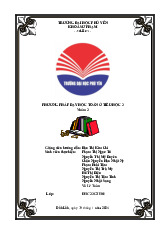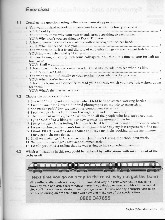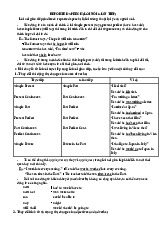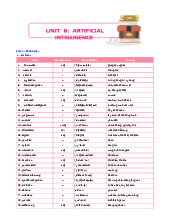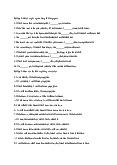


Preview text:
TENSES
Thì quá khứ hoàn thành/ Tiền quá khứ (The Past Perfect Tense) a. Cấu trúc (Form)
Subject + had + past participle (V3)
* Thể phủ định: S + hadn’t + V3
* Thể nghi vấn: Had + S + V3...? b. Cách dùng (Usage)
Thì quá khứ hoàn thành diễn tả một hành động quá khứ xảy ra trước một thời gian quá khứ hoặc trước
một hành động quá khứ khác. (Nếu trong câu có hai hành động quá khứ, hành động nào xảy ra trước ta
dùng Past Perfect, hành động nào sau ta dùng Simple Past).
Ex: We had lived in Hue before 1975.
When I got up this morning, my father had already left.
After the children had finished their homework, they went to bed.
It was the most difficult question that I had ever known.
Thì tương lai đơn (The simple Future Tense) a. Cấu trúc (Form) You, He, She, I, They + will I, We + will/ shall + V (bare-inf.)
* Thể phủ định: S + will/ shall + not + V(bare-inf.)
* Thể nghi vấn: Will/ Shall + S + V(bare-inf)...? - will not = won’t shall not = shan’t b. Cách dùng (Usage)
- Thì tương lai đơn thường diễn tả một hành động sẽ xảy ra ở tương lai.
Ex: He will come back next week.
We will/ shall need the money on the 15th.
- Thì tương lai đơn được dùng diễn đạt ý kiến, đưa ra một lời hứa hoặc một quyết định tức thì. Ex: I think Liverpool will win . I’ll phone you tonight.
“You can have it for $50 ” “OK, I’ll buy it.”
c. Các phó từ đi kèm:
+ someday: một ngày nào đó + tomorrow: ngày mai
+ next week/ month/...: tuần/ tháng/... tới
+ soon: chẳng bao lâu nữa
10. Tương lai gần (Near Future) a. Cấu trúc (Form) am He, She, It + is
+ going to + V(bare-inf) (dự định sẽ) We, You, They + are I+ am He, She, It+ + V-ing (sắp sửa) is We, You, They + are b. Cách dùng (Usage)
Be going to và thì hiện tại tiếp diễn (present continuous) được dùng để diễn tả một hành động sắp sửa xảy
ra hoặc một dự định sắp tới (thường thường trong câu không có cụm từ thời gian) Ex: My father is retiring.
Where are you going to spend your holidays?
I. Supply the correct verb form: Simple Past or Past Continuous.
1. When I (arrive) ………….. at this house, he still (sleep)……………….
2. The light (go)……………. out while we (have)……………. dinner.
3. Bill (have)…………….. breakfast when I (stop)…………….. at this house this morning.
4. As we (cross)……………… the street, we (see)………………. an accident.
5. Tom (see)………………. a serious accident while he (stand)………….. at the bus stop.
6. While my father (read)………………. a newspaper, I (learn)………….. my lesson and my sister (do)
………………. her homework.
7. The children (play)………………………. football when their mother (come) back home.
8. The bell (ring)…………………. while Tom (take) ………………a bath.
9. I (be)……………….. very tired because I (work)………………….. all day yesterday.
10. He (sit)……………… in a cafe when I (see) …………………him.
II. Give the right forms of the verbs in brackets: Simple Past or Past Perfect
1. They (go)………………. home after they (finish)………………… their work.
2. She said that she (already, see)………………………. Dr. Rice.
3. When we came to the stadium, the match (already, begin)……………………..
4. They told me they (not, eat)………………… such kind of food before.
5. He (ask) …………..why we (come)………………. so early.
6. After they had gone, I (sit)……………. down and (rest)……………..
7. Before she (watch)……………….. TV, she (do)………………. her homework.
8. After taking a bath, he (go)……………………. to bed.
9. What (be) …………………..he when he (be)…………………… young?
10. It was the first time I (ever, see) …………………….such a beautiful girl.
III. Give the right forms of the verbs in brackets: Past Tenses.
1. Yesterday John (go)……………….. to the store before he (go)…………….. home.
2. Our teacher (tell)…………… us yesterday that he (visit)……………… England in 1970.
3. When John and I got to the theatre, the movie (start) …………………already.
4. Before Alice (go)……………… to sleep, she (call)…………… her family.
5. When the phone (ring)…………….., I (have)…………………… dinner.
6. Daisy (agree)……………………… with other members in the last meeting.
7. What you (do)………………. at 6 p.m yesterday?
8. The little girl asked what (happen)……………….. to her ice-cream.
9. He (teach)………………….. in this school before he (leave) for England.
10. She (win)……………………… the gold medal in 1986. IV.
Give the right forms of the verbs in brackets: Simple Future or Simple Present
1. We’ll go out when the rain (stop)………………….
2. I (stay)……………….. here until he (answer)……………….. me.
3. Wait until I (catch)……………. you.
4. She (not come) …………….until you (be)………………. ready.
5. Miss Helen (help)……………… you as soon as she (finish) …………….that letter tomorrow.
6. After the class (be)……………… over, ask the teacher about that sentence.
7. I (come)……………….. and (see)…………………. you before I leave here.
8. We (go)………………… home as soon as we have finished our work.
9. I (wait)……………. here until you (come) …………….back tomorrow.
10. I (send)………….. you some postcards as soon as I (arrive)…………… in London.
